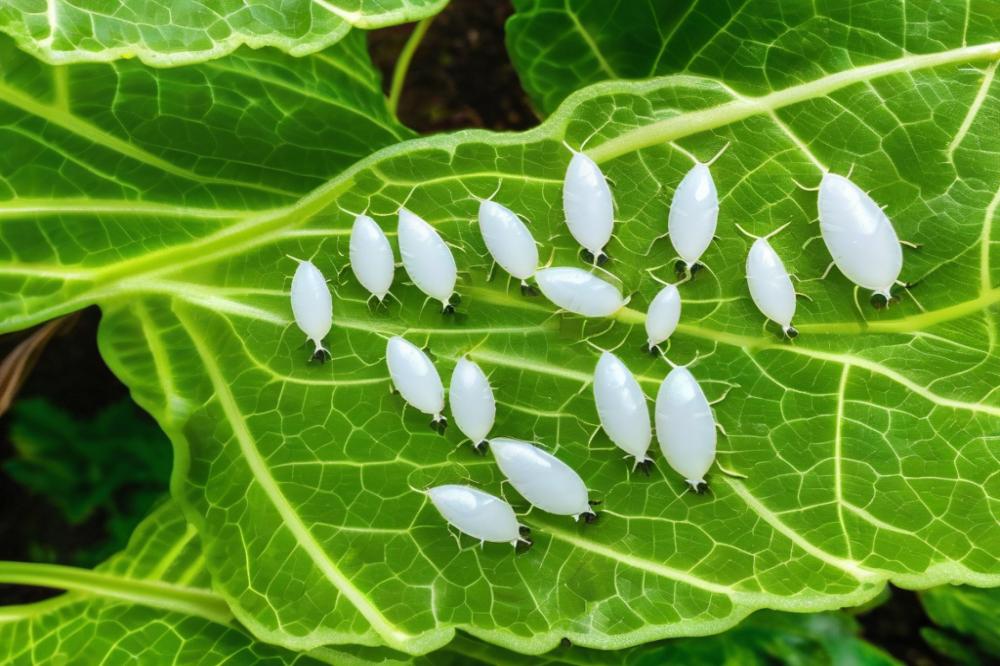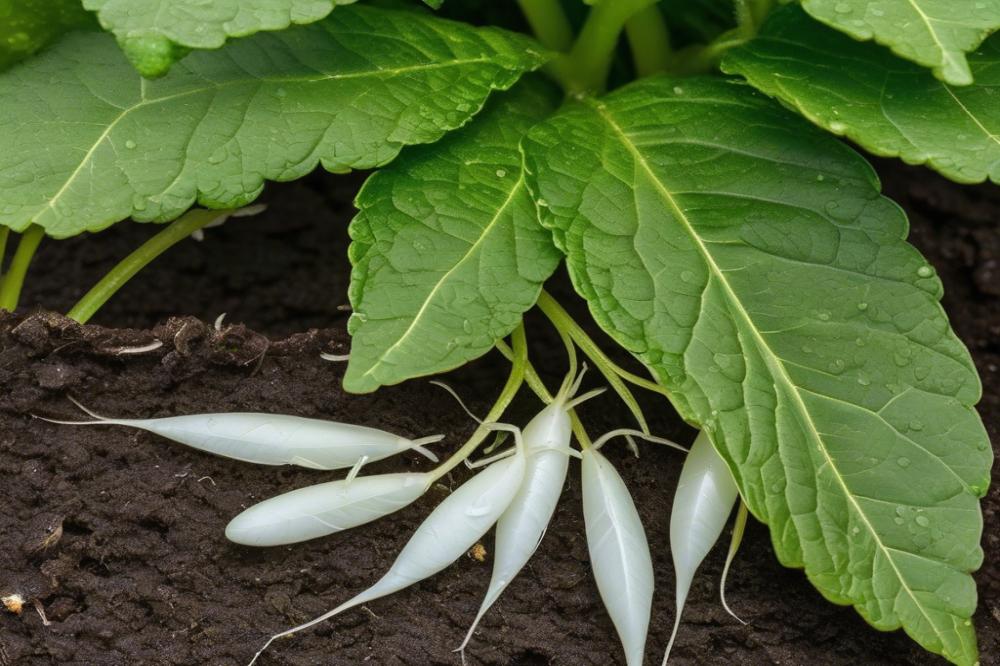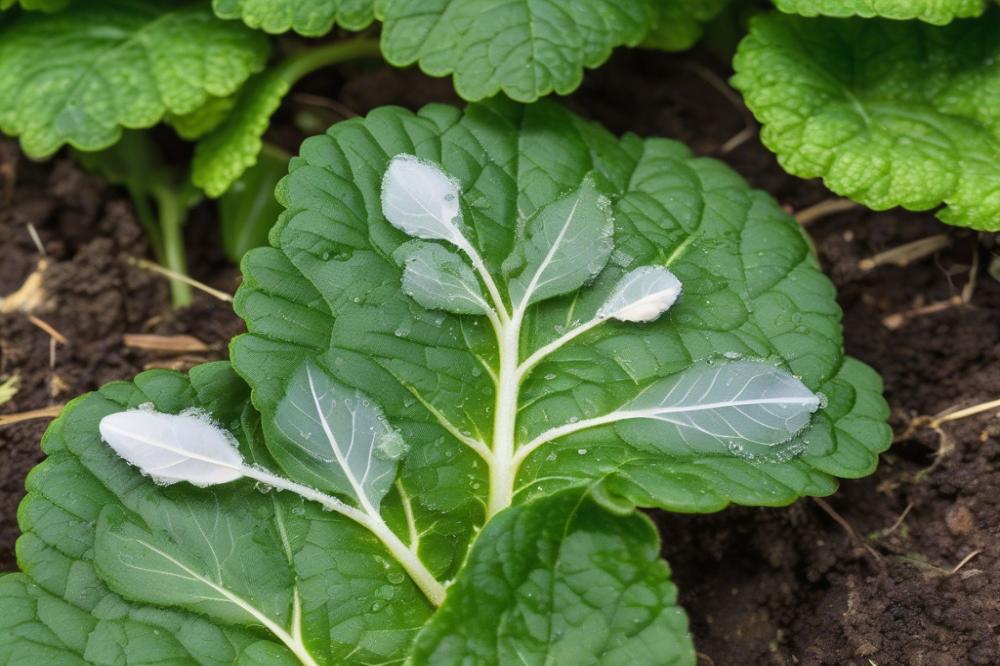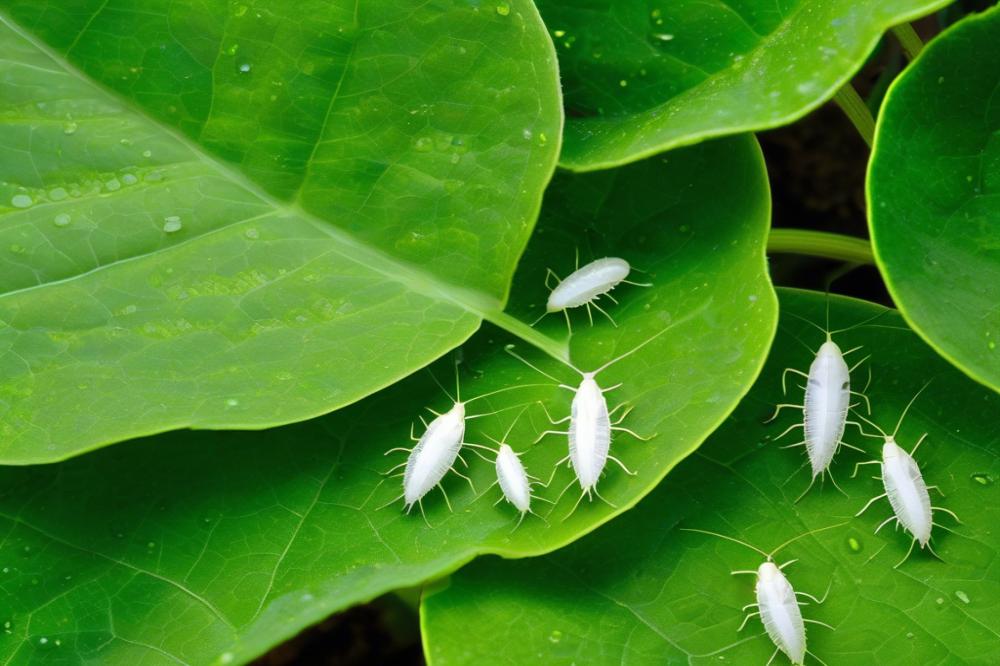Understanding a Common Garden Pest
Gardeners often encounter a variety of pests that can wreak havoc on their crops. Among these, whiteflies stand out as persistent nuisances. These tiny, sap-sucking insects can thrive in warm climates and are particularly attracted to vegetable gardens. Their presence is not simply an annoyance; it can lead to significant damage to plants if left unchecked.
The impact of these pests can be severe. Infestations may cause stunted growth, yellowing leaves, and even plant death. They are notorious for transmitting diseases between plants, which can further deteriorate the health of your garden. Maintaining healthy plants in your vegetable garden requires vigilance against these invaders.
Effective pest control is crucial for any gardener. Relying solely on chemical solutions can harm beneficial insects and disrupt the ecosystem. Instead, considering organic methods is advisable. Utilizing insecticidal soap or neem oil can be effective in managing their populations. Incorporating companion planting can also provide natural barriers against infestations.
Regular garden maintenance plays a significant role in prevention. Installing traps can help monitor their presence before an outbreak occurs. Furthermore, encouraging beneficial insects to thrive in your garden can keep unwanted pests at bay. By taking preventative measures, you can protect your plants and cultivate a thriving vegetable garden.
Understanding whiteflies


Whiteflies are small, winged insects that can become a significant problem in vegetable gardens. Measuring only about one-tenth of an inch, they have a fuzzy appearance due to their cottony wings. Their life cycle includes several stages, starting from eggs laid on the undersides of leaves. After hatching, they take on a nymph stage where they feed on plant sap. Eventually, they mature into adults, continuing the cycle of infestation.
Identifying these pests can be difficult but is crucial for effective management. Look closely under the leaves of your plants. Signs of an infestation include yellowing leaves, wilting, or a sticky residue known as honeydew. This residue can also attract other pests and lead to the growth of sooty mold. If you notice small white dots flying away when you disturb the plant, it’s a clear indication of their presence.
Certain conditions in gardens can attract these pests. Warm temperatures and high humidity create an ideal environment for them to thrive. Overcrowded plants with limited airflow can also increase the likelihood of a whitefly invasion. Maintaining healthy plants through proper garden maintenance can help prevent these issues. Employing organic methods such as companion planting may also deter them, as some plants naturally repel whiteflies.
To combat an existing infestation, a mix of pest control strategies is effective. Insecticidal soap and neem oil are popular choices among organic gardeners. Sticky traps can help catch adults flying around your garden. Additionally, encouraging beneficial insects like ladybugs provides natural control of whitefly populations. Regular monitoring and prompt action are key to keeping these pests at bay.
Effective Pest Control Methods


Pest control in your vegetable garden requires a mix of strategies. Many gardeners face challenges from various pests, but whiteflies can be particularly troublesome. Knowing how to manage them effectively makes a big difference. Start by exploring organic methods that are safe for your crops and the environment.
One effective way to combat these pests involves using insecticidal soap. This solution targets soft-bodied insects and is easy to apply. Another popular option is neem oil. Extracted from the seeds of the neem tree, it disrupts the life cycle of pests and can help keep your garden healthy.
Companion planting offers another layer of defense. Certain plants can repel pests or attract beneficial insects. For example, marigolds are often planted alongside vegetables to deter unwanted visitors. Using traps can also reduce pest populations. Sticky traps catch them, preventing further infestation.
Maintaining healthy plants is crucial for preventing pest problems. A robust garden is less susceptible to attack. Regular garden maintenance includes pruning and removing debris, which helps improve air circulation and reduces hiding places for pests. Additionally, incorporating beneficial insects into your garden can create a natural balance. Ladybugs and lacewings are excellent allies in controlling pest populations.
Consider preventative measures before the season begins. Planting resistant varieties can minimize future issues. Keeping a close eye on your garden allows you to spot problems early. By using a variety of methods, you can protect your crops and enjoy a thriving vegetable garden.
Organic Methods to Combat Whiteflies


When it comes to pest control in your vegetable garden, using organic methods can be both effective and safe. An excellent first step is applying insecticidal soap. This product suffocates small pests on contact by disrupting their cell membranes. Dilute it according to the instructions and spray the affected areas thoroughly. It works best when applied in the evening to minimize the risk of sun damage to your plants.
Another powerful natural solution is neem oil. Extracted from the seeds of the neem tree, this oil disrupts the life cycle of insects, preventing them from feeding and breeding. Mix it with water and a few drops of dish soap to create an effective spray. Spray it directly onto your plants, focusing on the undersides of leaves where pests often hide. Regular applications can significantly reduce pest populations over time.
Choosing organic methods brings several advantages to your garden’s health. For instance, avoiding harsh chemicals allows beneficial insects to thrive. Ladybugs and lacewings are vital allies in controlling pest populations naturally. Additionally, practices like companion planting can deter unwanted visitors. Certain plants naturally repel pests, helping to create a healthier ecosystem in your garden.
Implementing traps is another way to manage pest issues. Yellow sticky traps attract these insects and catch them, reducing their numbers. Place these traps near heavily infested plants to maximize effectiveness. This simple method can help monitor and control population levels.
Lastly, maintaining healthy plants makes them less vulnerable to infestations. Proper garden maintenance, including watering and fertilizing, strengthens plants, making them resilient against challenges. It’s also vital to adopt preventative measures, such as regularly checking plants for signs of distress or pest activity. Addressing problems early can save you time and effort down the road.
Companion Planting for Prevention


Companion planting serves as an effective strategy for keeping pests at bay in your vegetable garden. This method involves growing certain plants together to create a more balanced environment. Some plants can repel pests naturally, while others attract beneficial insects that help control unwanted species. Whiteflies find it harder to thrive in diverse ecosystems, making companion planting a smart choice.
How Companion Planting Can Deter Pests
Specific plants emit scents that ward off harmful insects. For example, marigolds are well-known for their pest-repelling qualities. Growing them alongside vegetables can create a barrier that keeps pests at a distance. Additionally, herbs like basil and mint can deter unwanted guests while enhancing flavors in your dishes.
Recommended Plants That Repel Whiteflies
Certain plant combinations work wonders for pest control. Consider planting nasturtiums, which attract aphids away from your vegetables. These vibrant flowers act as a trap crop, diverting attention from the vegetables you wish to protect. Other beneficial plants include dill and garlic, both known for their ability to keep harmful species at bay. Integrating these plants into your garden layout can lead to healthier plants overall.
Benefits of Biodiversity in the Vegetable Garden
Encouraging biodiversity offers numerous advantages for your garden ecosystem. A variety of plants fosters a habitat for beneficial insects, like ladybugs and lacewings, which help control pests. Maintaining a rich selection of plants can also improve soil health, which in turn supports robust vegetable growth. By reducing reliance on chemical treatments, you promote a healthier environment for both plants and wildlife. As you implement these preventative measures, consider how well they fit your garden’s specific needs.
Using Traps to Monitor and Control
Types of Traps Effective Against Whiteflies
Gardeners have several options when it comes to traps designed for pest control. Yellow sticky traps are among the most popular. These bright yellow sheets attract flying pests, making it easy to spot a problem. Some people also use blue sticky traps; however, yellow tends to work better for these pests. There are commercially available traps, but you can easily make your own as well. Some options involve mixing soap with water and using containers to capture pests effectively.
Setting Up Traps in the Garden
Placing traps in your garden is a straightforward task. Position them near affected plants but avoid blocking airflow and sunlight. Hanging traps can be effective when suspended above plants. Use stakes or string to ensure they remain elevated. It’s wise to check the traps regularly, aiming to replace them once they become crowded with insects. Think about positioning them around specific crops where you notice symptoms of damage. By diversifying trap locations, you can cover more ground.
Monitoring and Managing Whitefly Populations with Traps
Monitoring pest populations is crucial for effective management. Inspecting traps frequently helps you gauge the severity of the problem. Record the number of insects caught to track changes over time. If populations start to increase, you may need to incorporate additional action like insecticidal soap or neem oil. Both options are effective organic methods that target pests while being gentle on the environment.
In addition to using traps, consider introducing beneficial insects. Ladybugs or lacewings can naturally reduce pest numbers, providing another layer of protection for healthy plants. Companion planting also creates a natural defense by attracting these helpful insects. Always remember that preventative measures are pivotal for sustaining a thriving garden. Regular garden maintenance plays a significant role in preventing infestations before they even start.
Encouraging Beneficial Insects
Beneficial insects play a crucial role in pest control. They target and consume harmful pests like aphids and whiteflies. By fostering a habitat for these insects, farmers can set up a natural defense system in their gardens.
Attracting predators such as ladybugs and lacewings can significantly reduce pest populations. These insects thrive on aphids and other pests, helping to keep crops healthy without the need for harsh chemicals. Planting flowers like marigolds and dill will draw them into your garden, creating a friendly environment for these helpful allies.
To establish thriving beneficial insect populations, creating an inviting garden atmosphere is essential. Start by incorporating a variety of plants through companion planting. This method supports a diverse ecosystem, which in turn attracts various beneficial species. Maintaining diverse plant life not only provides shelter but also offers a continuous food source for these insects.
Regular garden maintenance should not be overlooked. Pruning leaves and clearing debris can help control excess moisture and reduce pests. Integrating organic methods like insecticidal soap or neem oil can provide immediate relief when infestations occur. However, keeping the garden biodiverse is crucial for long-term health.
Consider implementing traps to monitor pest levels without disrupting beneficial insects. This strategy allows gardeners to take preventative measures before major problems arise. All together, these approaches form a solid strategy to enhance the ecosystem of your vegetable garden.
Maintaining Healthy Plants
Strong, healthy plants are your first line of defense against pests. When plants are vigorous, they can withstand challenges better. This resilience is crucial for effective pest control. Healthy leaves and stems can discourage infestations, making it harder for pests to thrive. With this in mind, applying organic methods can go a long way in promoting plant health.
Regular garden maintenance is key. Watering plants properly promotes robust growth. Ensure your soil is nutrient-rich by adding compost regularly. This boosts the plant’s natural ability to fight off threats. Deep-root watering encourages plants to grow stronger roots. Making sure your garden has adequate sunlight also contributes to overall health.
Implementing preventative measures is smart. Consider companion planting, which involves growing different plants together to deter pests naturally. Marigolds can repel certain troublesome insects, leading to a healthier garden ecosystem. Also, keeping the garden tidy helps prevent pests from taking refuge in debris or dead plants.
Regular inspections should be a part of your routine. Look closely at leaves and stems to spot any early signs of trouble. If you find some issues, take action quickly. Insecticidal soap and neem oil are effective organic options to manage pests. Both treatments can help keep your plants thriving without harming beneficial insects.
Don’t forget about traps. Hang sticky yellow traps around your garden. They attract and capture unwanted visitors before they cause significant harm. This simple technique can be surprisingly effective when combined with proper care routines.
Encouraging beneficial insects is another method to consider. Ladybugs and lacewings feast on harmful pests. By creating a welcoming environment for these helpful critters, you enhance your garden’s overall health. Providing diverse plant life can support these insects while enriching your garden ecosystem.
Preventative Measures
Maintaining healthy plants is key to preventing an infestation. Regular garden maintenance can greatly reduce the likelihood of pest problems. It’s important to inspect your plants frequently for any signs of trouble.
Companion planting can be an effective strategy. By planting certain crops together, you can naturally deter pests while boosting your garden’s overall health. Additionally, introducing beneficial insects into your garden can provide natural pest control.
Early detection plays a crucial role in managing pest issues. If you notice anything unusual, act swiftly. Using traps can help monitor pest levels before they become a bigger problem.
Organic methods such as insecticidal soap and neem oil can be used when necessary. These products are safe for vegetables and can be quite effective against any lurking pests. Applying these treatments early can minimize potential damage.
Consider rotating crops to disrupt the life cycles of pests. This type of proactive approach helps keep your garden less appealing to various insects. Also, keeping the garden area clean and free of debris can discourage unwanted visitors.
Establishing a disciplined routine of checking plants is essential. Take time to observe for any signs of stress or damage. This vigilance allows for quick responses, ensuring your vegetable garden remains thriving.
Long-term practices can significantly contribute to a whitefly-free garden. Building healthy soil encourages strong plants, which are better equipped to resist pest attacks. The right gardening techniques can pay off in the end.
Wrapping Up Effective Whitefly Management
In summary, tackling whiteflies in your vegetable garden involves a combination of different strategies. First, introducing natural predators such as ladybugs can significantly decrease their populations. Neem oil serves as another powerful tool, disrupting their growth and offering a natural form of pest control. Additionally, regular monitoring of your plants allows for early detection, which can prevent a small issue from becoming a big problem.
Applying organic methods is not only beneficial in the short term but also helps maintain the overall health of your garden. Healthy plants are less prone to pest infestations, creating a more balanced ecosystem. Remember to use practices like companion planting or creating physical barriers, which can provide long-lasting results without harming beneficial insects.
Think about how vital it is to act promptly and follow through with preventive measures. A proactive approach can save you time and effort later, especially during peak growing seasons. Keeping your garden clean and uncluttered also plays a role in reducing the likelihood of future outbreaks.
Ultimately, a thriving vegetable garden requires consistent attention and care. While challenges will inevitably arise, addressing them with a mix of creativity and practical solutions will lead to success. Embrace these methods and stay committed to nurturing your plants. Your efforts will surely pay off in the form of bountiful harvests.



